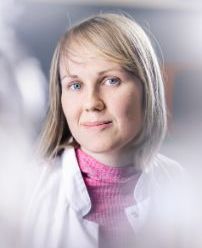Haapaniemi’s research interests include rare disease genetics and high-throughput biology. She recently completed her postdoctoral training in the group of renowned systems biologist, Jussi Taipale, at the Karolinska Institute in Sweden.
Expertise in high-throughput biology
Haapaniemi's postdoc included work with different high-throughput screening technologies and precision genome-editing, culminating in a landmark paper published in Nature Medicine, which showed that CRISPR-Cas9 can inadvertently disable the cellular DNA damage detection system and, in doing so, turn healthy cells into cancerous cells.
More on the Nature Medicine publication here.
Haapaniemi has a PhD from the University of Helsinki, where she studied in the group of Juha Kere. Her PhD focused on finding a genetic diagnosis for a group of patients with suspected monogenic immune disease, which subsequently involved working extensively with exome and genome sequencing. In addition, she was heavily involved in setting up the clinical exome-sequencing unit that exists today at the Institute for Molecular Medicine Finland (FIMM), which is also part of the Nordic EMBL Partnership for Molecular Medicine.
Clinical training will benefit NCMM's translational research expertise
Haapaniemi is also medically-trained, having completed clinical work in Finland across various disciplines, including emergency medicine and paediatrics.
Professor Kjetil Taskén, Director of NCMM comments:
“We are really pleased to welcome Dr. Emma Haapaniemi to NCMM.
- Her research interests and her expertise, particularly her medical training, will be of huge benefit to the Centre, particularly when it comes to enhancing the translational research potential of our existing groups.
"Emma’s planned research programme also fits very well with NCMM’s strategy for growing our expertise in high-throughput methods. We’re also excited about the work she has already done with FIMM, as this will hopefully be a great catalyst for encouraging more collaborations within the Nordic EMBL Partnership.”
Dr. Haapaniemi comments:
“I’m very much looking forward to joining NCMM, and to establishing my group in Oslo. The main focus of my research programme will be to develop safe and affordable CRISPR-based tools for the treatment of monogenic diseases.
- Rather than focusing on one pet disease or gene, we will try to develop methods to diagnose and treat larger populations of patients with genetic diseases. The aim will then be to translate these tools into clinical practice, thereby helping to improve the situation for patients suffering from various kinds of genetic diseases.
Adjunct position at Oslo University Hospital (OUH)
Before taking up her group leader role at NCMM, Haapaniemi will spend six months working at Oslo University Hospital from January 2019 in order to pursue her training in paediatrics. She will continue her residency part-time in parallel with setting up a group at NCMM.
She adds:
“Oslo University Hospital already has a good next-generation sequencing diagnostics platform, along with newborn screening programs for genetic immune and metabolic diseases. I find that my research fits with well with their aims to expand more towards personalized therapy for these conditions.”
Haapaniemi is expected to officially start working at NCMM in July 2019, and will also have an adjunct researcher position at Oslo University Hospital, Division for Paediatric and Adolescent Medicine (BAR).
